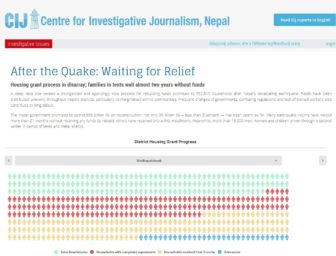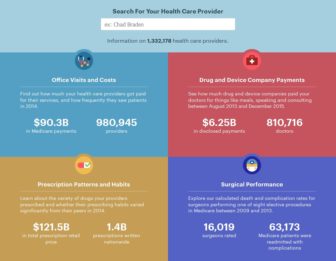It’s been a busy first quarter of 2017 for GIJN members — from picking up Pulitzer Prizes to successful launches of crowdfunding and a healthcare app. There have also been new projects and new collaborations forged. Have news for GIJN? Write us!
Here are some noteworthy splashes made recently by GIJN members near and far:
Pulitzer Prize Wins
 On April 10, the International Consortium of Investigative Journalists (ICIJ) was awarded this year’s Pulitzer Prize in Explanatory Reporting, along with McClatchy and the Miami Herald, for the Panama Papers project. The exposé, which revealed the hidden infrastructure and global scale of offshore tax havens, involved over 300 reporters on six continents, and has triggered protests, resignations, arrests, and fierce debate worldwide. The Pulitzer is among nearly 20 awards the project has won, including a George Polk Award, two honors from IRE, an ONA award, a Data Journalism Award, and a Bartlett & Steele prize.
On April 10, the International Consortium of Investigative Journalists (ICIJ) was awarded this year’s Pulitzer Prize in Explanatory Reporting, along with McClatchy and the Miami Herald, for the Panama Papers project. The exposé, which revealed the hidden infrastructure and global scale of offshore tax havens, involved over 300 reporters on six continents, and has triggered protests, resignations, arrests, and fierce debate worldwide. The Pulitzer is among nearly 20 awards the project has won, including a George Polk Award, two honors from IRE, an ONA award, a Data Journalism Award, and a Bartlett & Steele prize.
Many GIJN member organisations also partnered with ICIJ in this mother-of-all news collaborations, including amaBhungane Centre for Investigative Journalism, ARIJ, Armando.info, Center for Investigative Reporting in Pakistan, Connectas, Consejo de Redacción, Convoca, Centro de Periodismo Investigativo, Direkt36, El Faro, Korea Center for Investigative Journalism (Newstapa), KRIK, Malaysiakini, Ink Centre for Investigative Journalism, Organized Crime and Corruption Reporting Project, Ojo Público, Rise and the Czech Center for Investigative Journalism. Congratulations to all!
Fourth Pulitzer for ProPublica
 ProPublica and the New York Daily News won this year’s Pulitzer Prize in Public Service, for a joint investigation on widespread abuse of eviction rules by the New York City Police Department to oust hundreds of people, almost exclusively in communities of color.
ProPublica and the New York Daily News won this year’s Pulitzer Prize in Public Service, for a joint investigation on widespread abuse of eviction rules by the New York City Police Department to oust hundreds of people, almost exclusively in communities of color.
The two media outlets created multiple databases to analyse datasets of nuisance cases underlying criminal charges and alcohol-related incidents to determine whether the abuse of the nuisance abatement law was systemic. The results made clear it was. This award is ProPublica’s fourth Pulitzer, following their wins for investigative reporting (2010), national reporting (2011) and explanatory reporting (2016).
FOI Platform Set Up
On March 10, GIJN member Brazilian Association of Investigative Journalism (Abraji) and nonprofit Transparency Brazil launched Achados e Pedidos (Request and Found), a platform collating Law of Access to Information (LAI) requests and responses from Brazil’s legislative, executive and judicial branches.
 The platform, initially launched with more than 23,000 requests in its database, allows users to do a single search on the platform of a particular official or key word and access multiple results across different agencies that would otherwise be scattered. “On the platform, anyone will be able to find data that has already been obtained without having to make the same request again,” explained Abraji’s executive manager, Marina Atoji, at the launch event, as reported by the Journalism in the Americas blog. The platform will also act as a monitoring tool for LAI compliance.
The platform, initially launched with more than 23,000 requests in its database, allows users to do a single search on the platform of a particular official or key word and access multiple results across different agencies that would otherwise be scattered. “On the platform, anyone will be able to find data that has already been obtained without having to make the same request again,” explained Abraji’s executive manager, Marina Atoji, at the launch event, as reported by the Journalism in the Americas blog. The platform will also act as a monitoring tool for LAI compliance.
Crowdfunding Success

Direkt36 team
Hungary’s Direkt36 ran its annual crowdfunding campaign on March 16, asking supporters of investigative journalism to contribute and back their work in holding powerful institutions accountable. The nonprofit media organisation had previously produced investigative stories on Hungarian officials’ hidden assets, offshore secrets, public tenders linked to Prime Minister Viktor Orban’s son-in-law, and abuse of EU funds.
The campaign ended on April 13 with Direkt36 collecting more than 8.5 million Hungarian forints (27,500 euros) from as many as 1000 supporters — more than their initial goal of 5 million forints.
Nepal’s First Collaborative Data Project
 Nepal saw its first collaborative data project come to fruition early this year, with seven journalists from seven different news outlets working together to show that thousands of residents whose houses were destroyed in the April 2015 earthquake had not received promised grants to rebuild and many others were omitted from the relief rolls. The project, called “After the Quake: Waiting for Relief,” was sparked by last November’s Asian Investigative Journalism Conference in Kathmandu. Coordinated by IJAsia host Center for Investigative Reporting, Nepal and U.S. journalist Lucinda Fleeson, the project received support from another GIJN member, the Fund for Investigative Journalism.
Nepal saw its first collaborative data project come to fruition early this year, with seven journalists from seven different news outlets working together to show that thousands of residents whose houses were destroyed in the April 2015 earthquake had not received promised grants to rebuild and many others were omitted from the relief rolls. The project, called “After the Quake: Waiting for Relief,” was sparked by last November’s Asian Investigative Journalism Conference in Kathmandu. Coordinated by IJAsia host Center for Investigative Reporting, Nepal and U.S. journalist Lucinda Fleeson, the project received support from another GIJN member, the Fund for Investigative Journalism.
The reporters sorted through more than 6,000 pages of grant documents and discovered that the Nepal government had only spent 3 percent of more than US$900 million promised to residents to rebuild. International non-governmental organisations were also far from fulfilling their commitment. They built only 900 of a promised 22,000 houses, while some projects were abandoned midstream.
Fact-Checking with Facebook
 Correctiv, the pioneering German nonprofit investigative newsroom, is partnering with Facebook on its fact-checking initiative. Co-founder David Schraven told Nieman Lab: “It’s important for people to be kept informed in the right way. Where people are spreading false information from a friend to a friend to a friend, sometimes, if you have someone who breaks that line and says, hey, if you want to pass this information to a friend, please keep in mind that this could be very wrong — I do think this will change things a little bit.”
Correctiv, the pioneering German nonprofit investigative newsroom, is partnering with Facebook on its fact-checking initiative. Co-founder David Schraven told Nieman Lab: “It’s important for people to be kept informed in the right way. Where people are spreading false information from a friend to a friend to a friend, sometimes, if you have someone who breaks that line and says, hey, if you want to pass this information to a friend, please keep in mind that this could be very wrong — I do think this will change things a little bit.”
Correctiv will fact check stories flagged as “suspicious” by Facebook users and its research will be published on Facebook to allow users to decide the truth of the stories themselves. Although users will still be able to share these flagged stories on the platform, the articles’ visibility and priority in the news feed algorithm will be decreased.
Healthcare App Launched
 In March, ProPublica launched Vital Signs, an interactive web application that allows the public to research and compare healthcare providers. Users can find out how much their doctor got paid for their services, how frequently they saw patients, the variety of drugs he or she prescribed, and whether their prescribing habits varied significantly from their peers, among other information.
In March, ProPublica launched Vital Signs, an interactive web application that allows the public to research and compare healthcare providers. Users can find out how much their doctor got paid for their services, how frequently they saw patients, the variety of drugs he or she prescribed, and whether their prescribing habits varied significantly from their peers, among other information.
The Vital Signs app was built using Vital Signs API — another ProPublica tool which harnesses data from four ProPublica databases filled with data points that its journalists have spent years collecting, cleaning, and analyzing. The app aims to inform readers of the quality of care and also help health institutions identify and address problems with their healthcare providers.
New CIJ Director in London
 James Harkin was announced as the new Centre for Investigative Journalism (CIJ) director and will officially start his role on May 1. Harkin is a journalist who covers social change and political conflict. His work has appeared in Vanity Fair, Harper’s, GQ, The Smithsonian, Prospect and The Guardian.
James Harkin was announced as the new Centre for Investigative Journalism (CIJ) director and will officially start his role on May 1. Harkin is a journalist who covers social change and political conflict. His work has appeared in Vanity Fair, Harper’s, GQ, The Smithsonian, Prospect and The Guardian.
For the past five years, he’s been reporting on the Syrian conflict. His last book, Hunting Season, an investigative account of the rise of the Islamic State group and its campaign of kidnapping journalists, was published in November 2015 by Little, Brown in the UK and Hachette in the US.
Harkin succeeds the Centre’s Bertha fellow Matt Kennard, who took over as acting director when CIJ founder and director Gavin MacFadyen became ill in 2016 and passed away last October.

IT GIVES ME LIGHT AND KNOW MANY THING ABOUT FIELD OF JOURNALISM ITS MANAGEMENT AND CHALLENGES HAPPENS EVERY MINUTES.